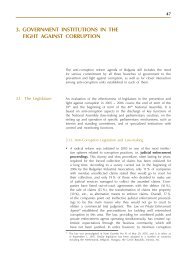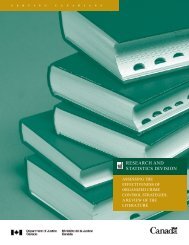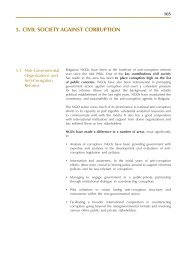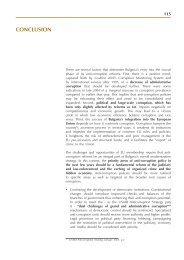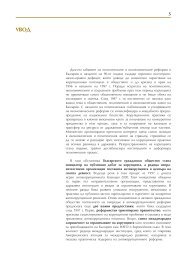National Threat Assessment 2008. Organised Crime - Politie
National Threat Assessment 2008. Organised Crime - Politie
National Threat Assessment 2008. Organised Crime - Politie
Create successful ePaper yourself
Turn your PDF publications into a flip-book with our unique Google optimized e-Paper software.
Almost all contacts in advance fee fraud are by telephone or email. When the<br />
target has responded to the first email his details are transferred to a ‘job owner’<br />
who carries out the swindle. The target is then given different contact details.<br />
If victims start asking difficult questions and do not immediately fall for the<br />
swindle they may also be approached by another contact person. As soon as<br />
the victims become ‘annoying’, when they stop paying and really want to see<br />
the money promised to them, the swindler breaks off all contact.<br />
During an investment fraud the swindlers quite often close the ‘Dutch’ office of<br />
the company. The customers are given the new (foreign) address and telephone<br />
number, at which the swindler can initially still be contacted. Again swindlers<br />
will hardly be contactable, or will be impossible to contact altogether, once the<br />
victim starts asking ‘difficult’ questions or wants to see his money. As soon as<br />
reports appear in the media in which certain investment funds are mentioned as<br />
being (possibly) suspect, the fraudsters disappear (abroad). In some cases new<br />
attempts are made to contact the victims after a while using so-called ‘sucker<br />
lists’. Sucker lists are lists of people who have already been conned by a mala<br />
fide stockbroker, which means that they are vulnerable to this type of fraud.<br />
3.3.3 Scale<br />
It is impossible to make a reliable estimate of the scale of fraud constructions, as<br />
fraud constructions are based on various underlying types of fraud. It is difficult<br />
to estimate the scale of these types of fraud for various reasons, including<br />
aspects of the registration process, dark numbers and differences in definitions.<br />
Nevertheless, we have still tried to provide an idea of the possible scale of the<br />
two types of fraud discussed here.<br />
Advance fee fraud<br />
In the period between 1 October 2006 and 1 November 2007 a total of 175<br />
reports of advance fee fraud were received. These reports were the starting<br />
point for further investigations as part of Project Apollo. 42 One of the results of<br />
the project was to identify 2536 people as victims. The victims mainly came from<br />
the United States, Italy, the United Kingdom and Germany. Gangs of swindlers<br />
who reside in the Netherlands usually victimise people abroad. On the other<br />
hand, Dutch citizens are mostly victimised by swindlers operating abroad. The<br />
number of cases in which groups abroad have victimised people in the<br />
Netherlands is unknown.<br />
42<br />
‘Apollo’ was a project launched by various investigating authorities in October 2006, the objective<br />
being to make the Netherlands unattractive to West African criminal networks. The project<br />
involved collaboration with private parties such as financial institutions and Internet providers.<br />
108 <strong>National</strong> <strong>Threat</strong> <strong>Assessment</strong> 2008 – <strong>Organised</strong> crime



